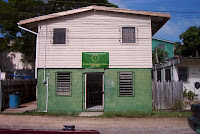Iowa Yearly Meeting is a group of programmed meetings in Iowa and Wisconsin. Iowa YM's worship has an evangelical bent to it (in the choices of music, for example), and I am reminded of the great range of diversity within FUM. This was underscored by their keynote speaker, Ron Stansell, who is from Evangelical Friends Mission. Candi Young, who teaches at Belize Friends (Boys) School, spoke about her work there. John Moru was visiting Iowa YM from the Turkana Friends Mission. Two Iowa YM members(Nathan and Brianna Martin), home from being missionaries in Cambodia to have a baby, also spoke.
 |
| Belize Friends Boys School |
Candi Young spoke about her desire to expand Friends (Boys) School in Belize, and her joy at the enthusiam of her students to learn. (I put "boys" in paraentheses because she showed us pictures of the first girls to attend the school!) I was reminded again of how much of a difference a little money can make. USFW donates the money to give each child there a snack: a banana, an orange, and a biscuit. For most of the children, this is all they will eat each day, and the cost is so small.
 |
| John Moru, testing water (FUM website) |
John Moru had several opportunities to speak, and was very engaging. FUM General Secretary Sylvia Graves, who was also visiting Iowa YM, spoke about Turkana Friends Mission being a "Kenyan" mission. Kenyan Quakers, having been evangelized by missionaries a century ago, are now traveling out to build missions themselves. Ron Stansell pointed out that FUM is not a white organization anymore, and Quakerism is not a white denomination. African and South American Quakers will take control of their own institutions, and take responsibility for missions in their area, in an increasing way. John Moru feels a particular calling to plant churches in Sudan, having been there as a child. With the majority-Christian southern part of Sudan separating off from the northern part on July 9th, he feels that his way will soon be clear.
 |
| ESR's registrar, April, presenting a workshop in Kenya |
I have been thinking lately about missionary work. Many Christians do "mission trips" within the US or to other countries, which seem to be a valuable tool for increasing cultural awareness and forming connections on both sides, as well as sometimes getting some practical work done! Our trip to Kenya and Africa was, in some sense, similar. The intetion was to develop our awareness of African Friends and to offer some workshops and presentations. I do, however, wonder about long-term church-planting. Some point to the great commision given in Matthew 28:19-20 ("Therefore go and make disciples of all nations, baptizing them in the name of the Father and of the Son and of the Holy Spirit, and teaching them to obey everything I have commanded you. And surely I am with you always, to the very end of the age.") Some believe that non-Christians will go to hell and conversion is an imperative. Others see this conversion as colonialism, or unnecessary given strong religion traditions across the world and point more to interfaith dialog.
I wonder what it would be like to go plant a church in a place with a strong religious culture. How does a missionary in Cambodia or Thailand view Buddhism? What would it mean to be a Christian missionary in Saudi Arabia? Can one be a long-term Christian missionary and respect the validity of other religions? Can one take a "come and see" attitude (John 1:46), offering what Quakers have available while respecting the existing religious and denominational forces in a particularly area?
Just some thoughts on my mind this morning! It was lovely to visit with Friends in Iowa YM and I enjoyed worshipping with them very much.
 Valerie Hurwitz is Director of Recruitment and Admissions at Earlham School of Religion. She lives in Richmond, Indiana and serves as choir director at West Richmond Friends Meeting.
Valerie Hurwitz is Director of Recruitment and Admissions at Earlham School of Religion. She lives in Richmond, Indiana and serves as choir director at West Richmond Friends Meeting.





